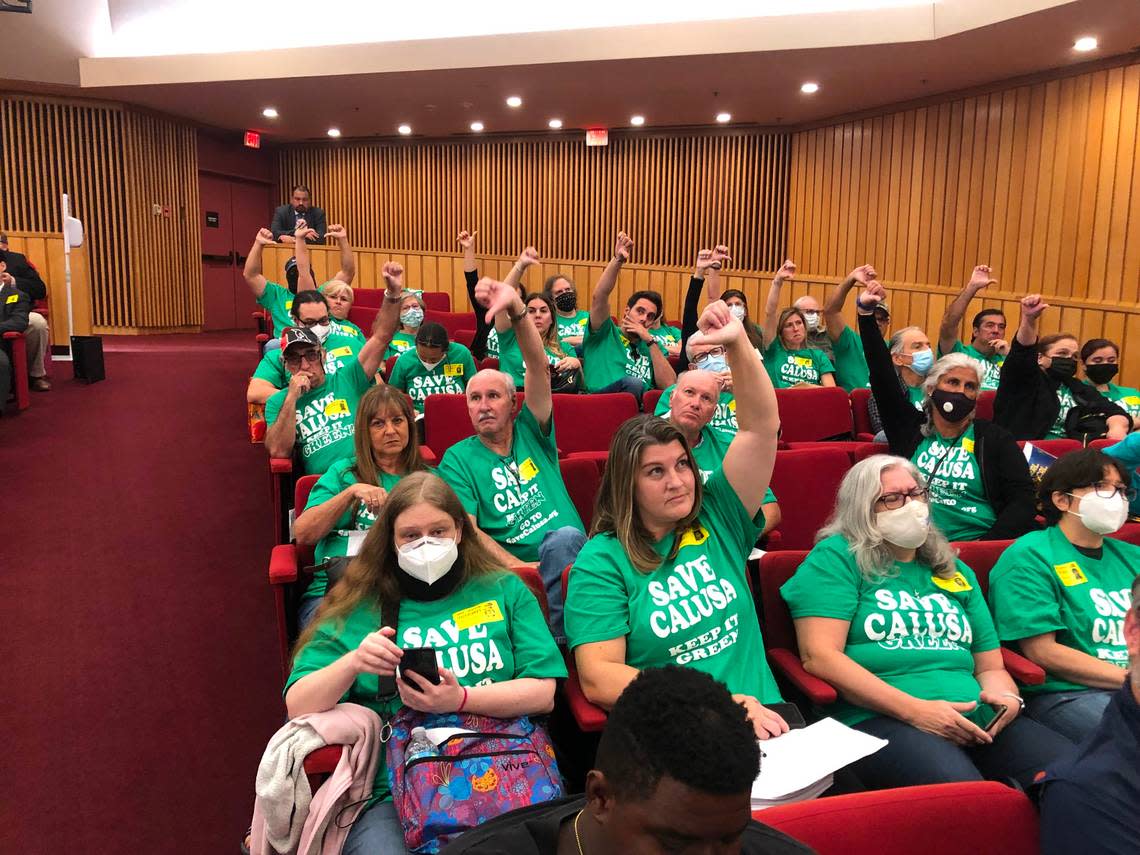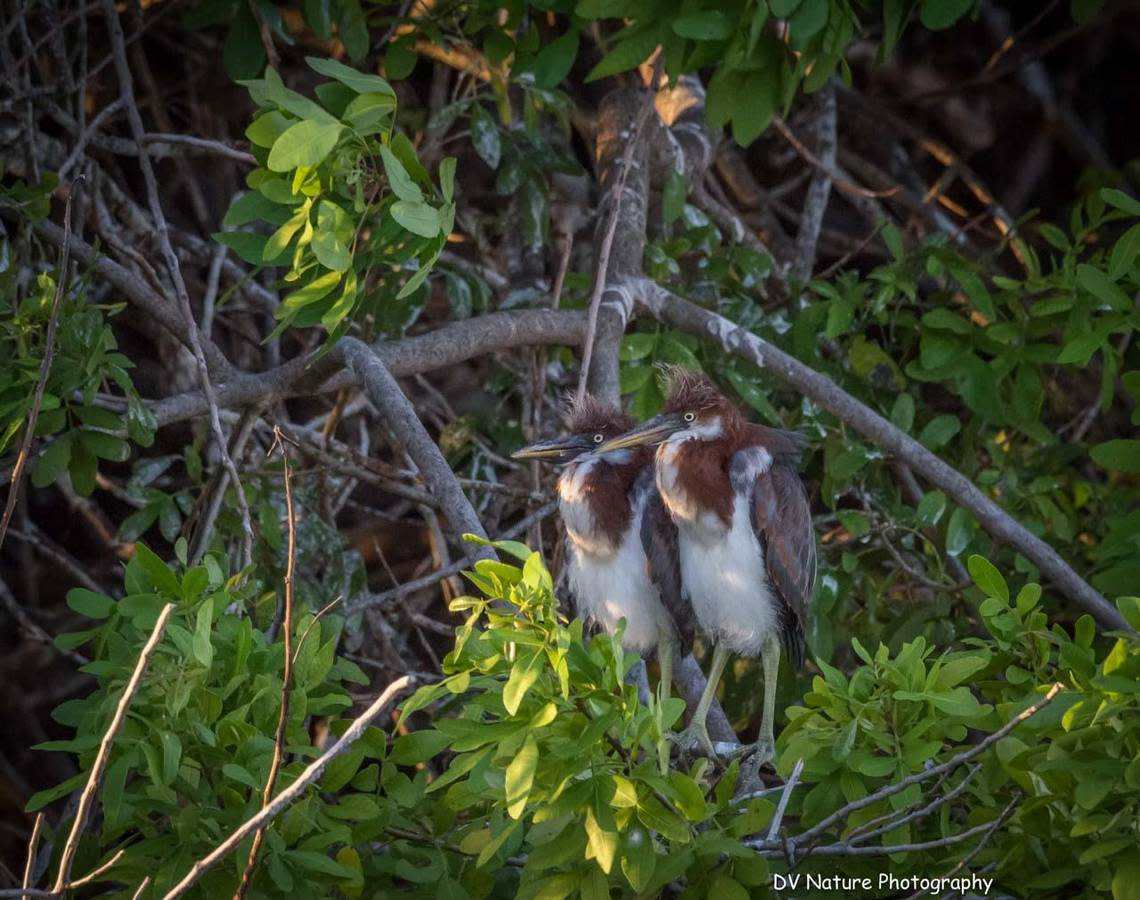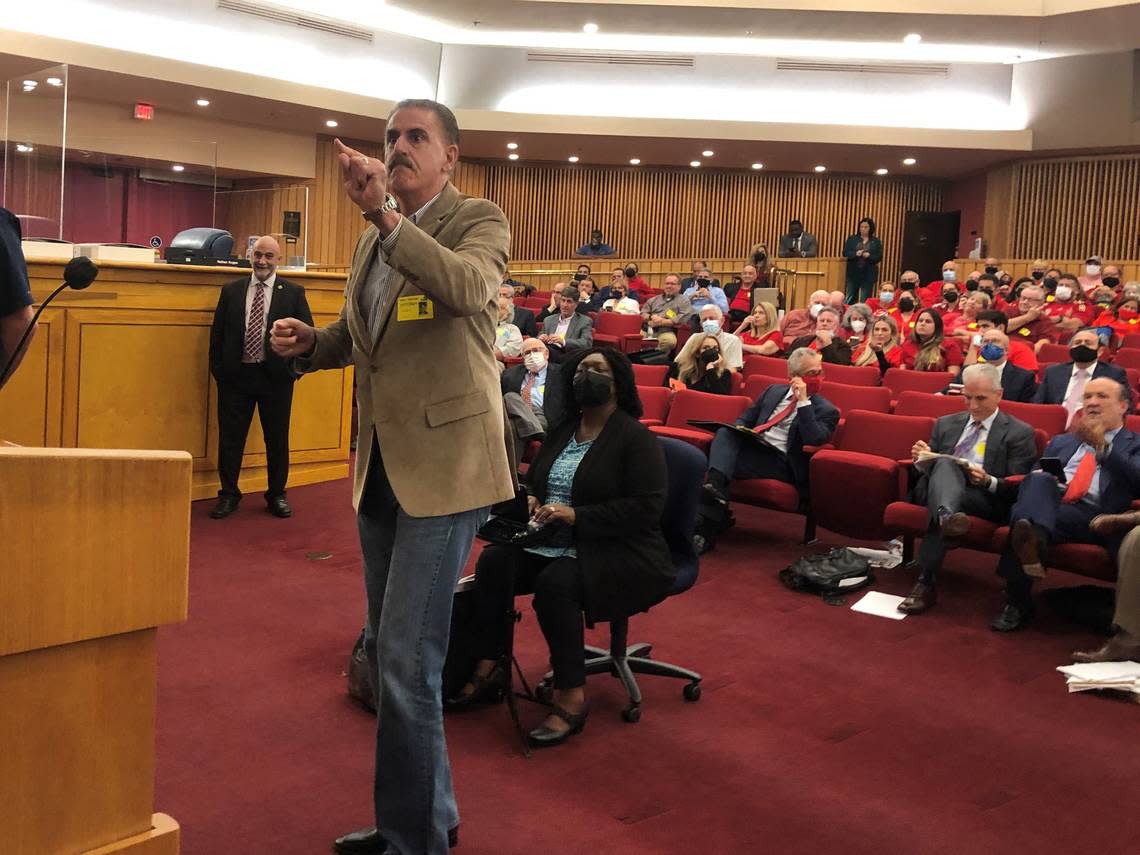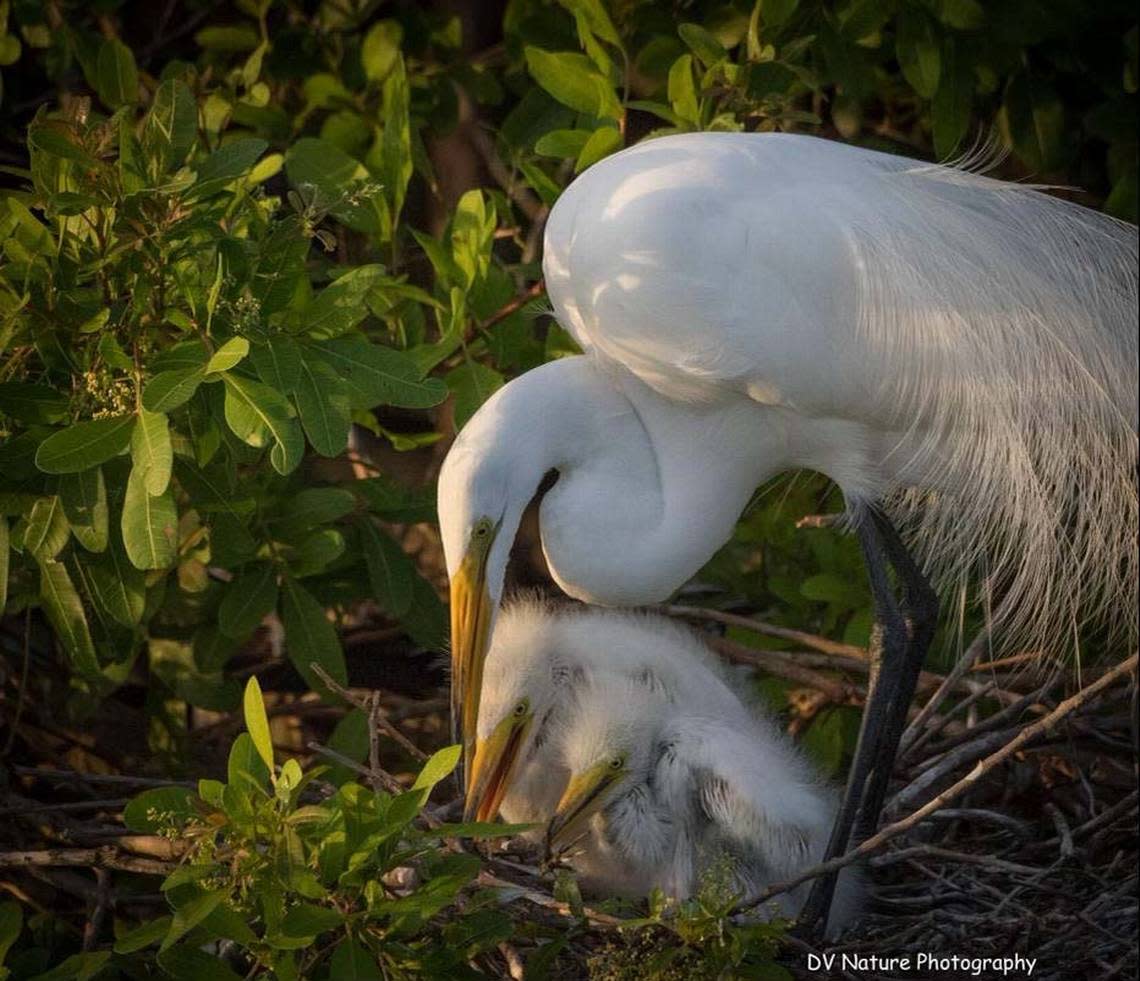Homeowners score two wins in their fight to block major Miami-area development
Like the diminutive but resourceful tricolored herons nesting on the water hazard islet of an overgrown, defunct golf course, you could say the homeowners of the Calusa community are a threatened species, too, trying to save their habitat from more suburban sprawl.
Against all odds — and in Miami-Dade County those odds include a major real estate developer, the Bacardi family and pro-growth politicians — score rounds 11 and 12 for the underdog in a years-long fight over the fate of prime Kendall land.
Tenacious residents who want to block or reduce the size of a proposed subdivision that threatens to clog their streets, crowd their schools, exacerbate flooding and destroy Mother Nature’s reclamation of the abandoned fairways won two victories this week. Their victories come one year after county commissioners approved a 550-home development on the old 168-acre Calusa Country Club property on Kendall Drive, and the same week commissioners agreed to move the Urban Development Boundary line closer to the Everglades to make room for a different project.
READ MORE: County commission overrides veto, clears project outside urban boundary near Biscayne Bay
“We are the little guys with limited resources, and we are gratified that our voices were heard, finally, when we stood up and said that the first priority in important zoning decisions should be the people who live there, not the billion-dollar developers,” said Amanda Prieto, leader of Save Calusa, a coalition of her neighbors. “Now, we get a second chance to make this project better.”

County says nests must be protected from construction
The county’s Department of Environmental Resources Management (DERM) confirmed that six tricolored herons — categorized as threatened or imperiled by the state of Florida — have made three nests at Calusa and ordered that the island they and hundreds of other birds use as a rookery must be preserved and buffered from new construction. Calusa, which has 2,074 homes, is located between Kendall Drive and Southwest 104th Street, from Southwest 127th to 137th avenues.
Developer GL Homes had originally planned to fill in the lake and build over the island and argued that most of the birds roosting there were common cattle egrets. Residents complained the developer did its environmental surveys outside of nesting season and also tried to drive away wildlife with aggressive mowing and trimming.
Mayor Daniella Levine Cava, who opposed the project and promised residents that DERM would conduct thorough field surveys, reiterated in a Nov. 7 memo that GL Homes must now submit a plan for DERM’s approval showing how it will ensure conservation of the species.
Developer will build around the lake, birds’ nests
GL Homes Executive Vice President Dick Norwalk, who objected to residents’ characterizations of “routine maintenance activities as nefarious acts,” said his company has always been committed to protecting natural habitats and will honor its promise to preserve the rookery.

“We closely monitored the island, led the inspections and submitted reports in a collaborative effort with DERM,” he said. “It was not adversarial.”
GL Homes will revise its site plan, he said.
“We will now re-plan that section around the lake and rookery,” he said. “That may cost us a few homes.”
Appeals court says county must do over zoning hearing
On another front, residents prevailed in a ruling by the 3rd District Court of Appeal ordering the county commission to throw out its 2021 reclassification of the golf course property from “parks and recreation” to “residential.” Commissioners voted 10-2 to rezone the property at the developer’s request, but the appeals court said the county failed to give proper public notice of the hearing, thus hindering public input, and must do it over.
READ MORE: ‘Can’t buy wildlife once it’s dead.’ County approves 550-home plan on former golf course
“We were right, they were wrong, and the court backed us up,” said Miami attorney David Winker, who is representing Save Calusa. “The developer and the county rushed the zoning hearing before the environmental studies were finished, made a decision based on incomplete information and the court called them for hiding the ball and not following the rules.
“The residents look forward to a fair chance to give their side and show why this project is a bad deal.”
Prieto, her neighbors and their supporters — including the Sierra Club, the Audubon Society and Zoo Miami spokesman Ron Magill, who stated, “You can buy consultants, but you can’t buy wildlife once it’s dead,” before he was cut off — were limited to one-minute entreaties to keep Calusa wild at the last zoning hearing, while GL Homes and its consultants got more presentation time.

Prieto is hoping for a different outcome — maybe even a miracle outcome — that would preserve Kendall’s oasis and open it to the public.
“We’ll have a new set of commissioners, the rezoning has been removed, the value of the land goes down. Would the county buy it and turn it into a park?” she said. “The developer’s argument that we need to infill Calusa and build more houses because we can’t move the Urban Development Boundary is no longer valid since commissioners voted to move the UDB. And this is not affordable housing anyway; it’s a luxury development.”
Save Calusa has suggested that Facundo Bacardi — the head of the rum empire who bought the golf course for $2.7 million in 2003 and has a stake in the development project with GL Homes — donate the land and turn it into the Bacardi Nature Preserve, “a beautiful legacy compared to bulldozing it to build yet another gated community,” Prieto said.
“At what point does this project no longer make sense?” Prieto said. “Clearly, the residents are not giving up.”
GL Homes: County needs single-family homes
Norwalk said the county and GL Homes could decide to appeal the ruling or go back before the commission for a do-over of their rezoning application.
“Residents have a right to make challenges but this was unusual in that it was a procedural challenge, not a challenge of the substance of the plan, which the commission approved,” he said.
Norwalk has consistently argued that the land’s best use is residential given that county studies show the dwindling supply of building sites for new single-family homes will be exhausted by 2025. GL Homes cut the number of houses from 1,000 to 550, giving it the lowest density of any golf course redevelopment in the county.
He also says some residents’ concerns are exaggerated, stating they have “painted this fantasy of an environmental Xanadu when it’s actually a degraded former golf course.”
A bat survey requested by homeowners showed the endangered Florida bonneted bat foraging over the course, but Norwalk said his consultants found no evidence of the bat roosting at Calusa.
READ MORE: Can bats halt bulldozers at overgrown Kendall golf course? Some neighbors hope so
The fenced-off property is privately owned and was never publicly accessible, so GL Homes is not taking park space away from anybody, he says.
Dispute goes back years
The history of the Calusa dispute dates back more than a decade. The original 1967 covenant required the property remain a golf course for 99 years until 2067 unless 75 percent of abutting or ring homeowners agreed to lift it.

Bacardi bought the golf club for the $2.7 million bargain price in 2003 — knowing it was restricted by the covenant and zoned as parks and recreation. Soon after, golfers began to notice its deterioration.
After hurricanes Katrina and Wilma hit in 2005, the damaged clubhouse wasn’t repaired and was replaced by a trailer and Porta-Potties. The course was closed in 2011.
Bacardi offered ring homeowners $50,000 each to waive the covenant. They didn’t, so Bacardi sued them. The covenant was upheld in a court ruling in 2016, but Bacardi said he’d continue the legal battle to invalidate it, then paid off weary ring homeowners with individual settlements of up to $300,000. Of 146 ring homeowners, 123 accepted payments and signed waivers, fracturing the community.
Commissioners released the covenant in October 2020, paving the way for new houses on the old course. GL Homes paid Bacardi $32 million for the property and he has a 35 percent stake in the development venture.
Prieto said Save Calusa wants to inspire other neighborhoods with its campaign against “oversaturated development.”
“People get frustrated and think they don’t have the power and money and influence to beat developers and their fleets of lawyers,” she said. “We’ve accomplished a lot on a shoestring of $100 donations, knocking on doors, getting to know our neighbors. Most of the Calusa homeowners who took the money have moved out. We stayed to save our community from unfair zoning and hopefully set an example for saving others.”
